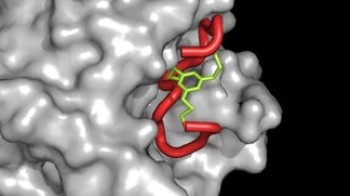Apr 15 2013
A new class of drugs for the treatment of severe diseases such as cancer and autoimmune diseases is developed by the start-up Bicycle Therapeutics. The company is generating bicyclic peptides that can selectively bind disease-related proteins and to modulate their function without affecting other proteins in the body.
 A bicyclic peptide (in green and red) bound to a protein © 2013 LPPT
A bicyclic peptide (in green and red) bound to a protein © 2013 LPPT
Over the past fifteen years, new molecules known as monoclonal antibodies have proven to be particularly effective in the treatment of certain types of cancer and autoimmune diseases such as rheumatoid arthritis. They also represent nearly half of the ten drugs that generated the largest revenues in 2012. But their relatively large size both prevents their effective dissemination in some tissues and requires administration by injection. In addition, they cannot be chemically synthesized, which, for the pharmaceutical industry, complicates their manufacturing. Bicycle Therapeutics is developing a new class of therapeutic agents approximately 100 times smaller. These molecules, termed bicyclic peptides, have similar binding qualities as monoclonal antibodies without sharing their limitations. Based in Cambridge, this start-up is supported with knowhow developed at the EPFL and is also licensing a patent from here.
Bicyclic peptides are named as such because they contain two loops of amino acids. They can uniquely bind to almost any biological structure and act on the target while leaving healthy cells intact. For example, they can connect to proteins of a tumor cell and inhibit its growth without affecting the surrounding tissues. The therapeutic agents are isolated from large combinatorial libraries of bicyclic peptides using a technique called phage display.
Christian Heinis, currently a professor at EPFL, got the idea during his post-doc at the MRC (Medical Research Council Laboratory of Molecular Biology, Cambridge, UK). He sought to develop a molecular structure similar to that of the antibody that is capable of binding the target proteins, but much smaller, allowing efficient tissue distribution and production by chemical synthesis. This new molecular structure would also be compatible with techniques leading to the identification of structures that specifically bind the target proteins.
The researcher, in collaboration with Sir Greg Winter, has developed a technique to isolate bicyclic peptides that effectively bind a range of clinically relevant targets. Currently, Heinis is pursuing his research at EPFL’s Laboratory of Therapeutic Proteins and Peptides (LPPT). His research group has recently demonstrated the therapeutic effect of a bicyclic peptide in vivo. They have also shown how bicyclic peptides bind to their targets. In addition to his work at EPFL, Heinis serves as a scientific consultant for Bicycle Therapeutics.
In late 2012, the company successfully raised 5.5 million francs to finance the pursuit of candidate molecules for various treatments and to assess their therapeutic potential.